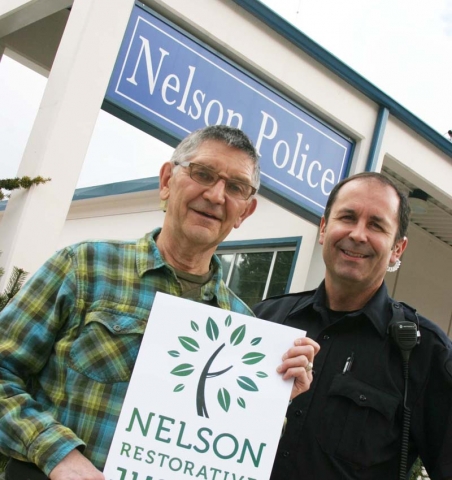Nelson Police Department rolls out innovative Restorative Justice Program
The Nelson Police Department is advocating for the introduction of a Restorative Justice program as an option to laying criminal charges when a crime has been committed.
The program, spearheaded by NPD Sergeant Dino Falcone and coordinated by Restorative Justice Program Coordinator Gerry Sobie, is looking for volunteers.
Sobie helped establish and run the Cranbrook RCMP Restorative Justice Program, from 2005 to 2009.
“As the Department’s Community Policing Officer, I support any initiative that allows a victim and an offender, by means of a trained community facilitator, to resolve their differences and restore peaceful relations, without the necessity to rely on a costly and time consuming criminal justice and/or court system,” Sergeant Dino Falcone said.
Sgt. Falcone said Restorative Justice Programs have been implemented in many BC communities, in Canada and throughout the world.
Some elements of Restorative Justice originated with circle meetings Aboriginals used and developed over time.
BC enjoys a reputation for having many different Restorative Justice Programs.
“Restorative Justice is a compassionate, cost-effective and time-tested method of recognizing the harm done to a victim,” said Chief Constable Wayne Holland of Nelson Police Department adding Mr. Sobie has the full support of the men and women of the Nelson Police Department.
“It also encourages a first-time offender to return to a life-style that respects the rights of others and provides them with the opportunity to be law-abiding and productive members of the community.”
The RJ program would receive a file from an arresting officer of an individual charged with a criminal offense.
In this case, the individual accepts responsibility for his/her actions and is prepared to meet with the victim to begin to repair the damage resulting from the offense.
The victim, as well as supporters who have been affected by the incident, are invited to participate.
The offender and victim agree on ways to begin repairing the harm done.
Once the offender completes her/his agreement the matter is resolved, hence no need to proceed using the Criminal Justice system as the offender has been given the opportunity to resolve this offense.
Completion of punishment by the offender using the RJ program results in no criminal record.
However, before the Nelson version of the RJ program can get off the ground hearing cases volunteers are required to form the panel.
These members must undertake intensive training to learn how to meet with offenders and victims, prepare them for the process, conducting meetings, and mentor offenders to successfully complete their agreements.
Applications for volunteers available on the NPD website (www.nelsonpolice.ca) or at the front desk of the Station at 606 Stanley Street.
The Restorative Justice program is not the first its kind in the area.
The Kootenay Restorative Justice Society (KRJS) was formed 12 years ago and provides restorative justice and preventative bullying programs to the Slocan Valley, Salmo, Nelson and surrounding areas.
The KRJS receive their referrals from RCMP as well as schools and community members.
Sgt. Falcone said as the Nelson Restorative Justice (NRJ) program grows, there is the potential to collaborate with KRJS by sharing resources and training.
However, the source of Nelson referrals will be our local Police Department.
“The Nelson Police Board is extremely pleased with the implementation of our own Restorative Justice program here in Nelson,” said Mayor John Dooley, Chair of the Nelson Police Board.
“A citizen deserves an opportunity to make amends to society and to their victims.”
“This program, which has my support, has been previously successful in removing any barriers that may exist between a first-time offender, their victims and our law enforcement personnel,” Dooley added.


























